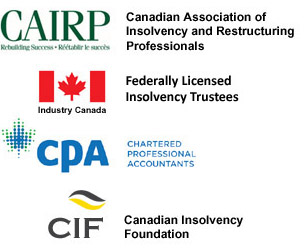Human Resources Development Canada
HRDC OVERPAYMENTS
HRDC Overpayments typically represent amounts paid to or received by someone who has received Employment Insurance, Disability and/or other benefit payments of a similar type.
Overpayments generally arise when individuals have received these payments while they were ineligible, or where their entitlement was actually lower, and the payments they received were larger than they should have been.
THE TREATMENT OF HRDC OVERPAYMENTS DEPENDS ON HOW THEY ORGINATED
If a person worked while at the same time they claimed and received Employment Insurance Benefits, or worked while receiving Disability Benefits, HRDC will proceed on the basis that these sums were obtained through fraud or misrepresentation.
Section 178 of the Bankruptcy and Insolvency Act stipulates that debts obtained by fraud or misrepresentation shall survive and are not covered by a consumer proposal. HRDC will be able to pursue and enforce their claim notwithstanding that you filed a consumer proposal, which was binding on all the other creditors.
As proof of fraud or misrepresentation, HRDC will rely on the filing of false Employment Insurance claim forms or reports, or in the case of individuals on Disability, returning to work or working for cash without notifying HRDC of their change in circumstance.
As a general rule, if the error or overpayment was caused by HRDC, the debt can be included in a consumer proposal. If it resulted from the filing of false benefit claims or failure to provide notice to HRDC when a person went back to work, the overpayment remains fully enforceable by them.
THERE ARE DIFFERENT COMPONENTS TO AN HRDC DEBT
In some cases, HRDC will add interest and penalties, such that the balance they are seeking greatly exceeds the original overpayment. There is an important distinction to make, however, regarding the breakdown of the amounts owed.
HRDC debts are usually comprised of three main categories:
1) Actual amounts received while ineligible (the Overpayment);
2) Interest charged on the Overpayment;
3) Penalties assessed on the Overpayment.
WHAT AMOUNTS ARE REPAYABLE, IF ANY?
Section 178 of the Bankruptcy and Insolvency Act limits a person’s liability for repayment to only the actual amounts received by an individual while ineligible. Interest and penalties are assessments and do not represent amounts which were overpaid to an individual. As such, the penalties and interest portions are not enforceable outside of a person’s consumer proposal.
Depending on how long the HRDC liability has been outstanding, there may be a significant reduction in the claim, with all interest and penalties portions included in the consumer proposal.
For further information on the treatment of HRDC overpayments, please do not hesitate to contact one of our Consumer Proposal Specialists who can provide you with more detail and offer commentary on your specific situation.
Send us an Email, Ask us a Question, Have us Call You!

